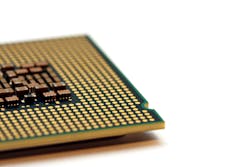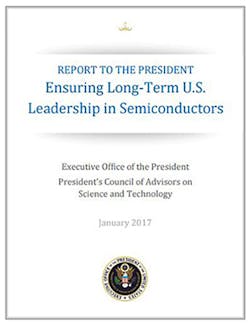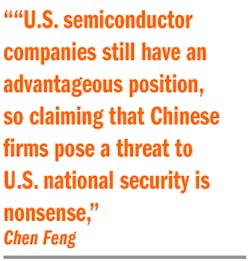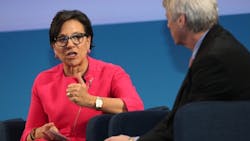Warning against China, White House Report Urges Faster Chip Innovation
If all goes according to plan, China's $150 billion fund to build its domestic chip industry will be empty by 2025 and the country will produce 70% of the chips that it buys. But how China spends that money in the meantime is coming under scrutiny.
A White House panel of semiconductor experts released a report last week saying that China's push into microchips threatened to harm American chip makers and risk U.S. national security. In the report, they advised Congress to invest heavily in advanced research and work with allies to impose stricter export controls for semiconductors.
The report is the fruit of an advisory board that the President's Council of Advisors on Science and Technology formed in November to urge policies to protect American innovation in semiconductors, the tiny electronic organs in everything from smartphones to satellites to missile systems.
The report underlines the growing concern in Washington about the implications of China's push to acquire insight into chip manufacturing. In recent years, the country has been accused of using subsidies to fund acquisitions of foreign firms and to bolster national champions like Tsinghua Unigroup, which bid $23 billion for Micron Technology in 2015.
“We found that Chinese policies are distorting markets in ways that undermine innovation, subtract from U.S. market share, and put U.S. national security at risk,” the White House said in the report, which also noted that Chinese chip makers have conspired to steal intellectual property and lower the value of takeover targets.
The Semiconductor Working Group, as the panel is known, includes John Holdren, the director of the office of science and technology policy, and Paul Otellini, the former chief executive of Intel. Among the 10 other members are include Ajit Manocha, a former C.E.O. of GlobalFoundries, and Paul Jacobs, the executive chairman of Qualcomm.
The report lacked specific remedies to limit China's semiconductor ambitions, but it cautioned against blanket opposition to the country's growth. Instead, it advised lawmakers to fund transformative research to combat the growing cost and complexity of the most sophisticated chips.
The report also called for Congress to lower corporate tax rates and speed the application process for building chip factories in the United States. Instead of restricting Chinese advances in supercomputers and mobile chips, these policies would spur growth in the American industry, the report said.
"The only way to retain leadership is to outpace the competition," the report said, urging the government to sponsor moon-shot projects, like quantum computing and brain chips, that could result in critical technology advances. "Policy can, in principle, slow the diffusion of technology, but it cannot stop the spread."
The influence of the report remains to be seen. The recommendations face an uncertain future in the Donald J. Trump administration starting later this month. But the president-elect has supported policies that many chip executives have supported, like a lower tax rate and incentives to revive American manufacturing.
The panel that drafted the report is one of the first attempts in decades to protect U.S. chip dominance. It was last threatened in the 1980s when Japan passed the United States in chip sales. In 1988, Congress created an advisory board similar to the Semiconductor Working Group that helped to revitalize the American industry by 1994.
The latest report bears a resemblance to the policies suggested by that panel, the National Advisory Committee on Semiconductors. It pushed for weaker antitrust laws, tax incentives for building U.S. factories, and increased funding for research centers like Sematech, which has since lost government support.
Congress also used a special trade deal with Japan to rally American companies. In 1986, U.S. chip makers successfully lobbied Congress to threaten legal action against Japan unless it voluntarily imposed trade restrictions itself. In addition to preventing Japanese firms from selling memory devices below cost, the deal also allowed Congress to fix the price of chips imported into the United States. That ensured American chip makers could claw back market share.
These accusations are not new. In an October speech on semiconductors, Penny Pritzker, the U.S. Secretary of Commerce, accused China of artificially reducing the price of semiconductors by adding around $150 billion into the global market. China has employed similar tactics to pull the strings on markets for steel, aluminum, and solar panels, she said.
China uses those subsidies to help domestic chip makers and investment firms acquire more advanced rivals in the United States and Europe. But over the last two years, a panel known as the Committee on Foreign Investment in the United States, or Cfius, has increasingly questioned such deals because of national security risks.
The panel's decisions carry a lot of weight. Last February, Fairchild Semiconductor rejected a $2.46 billion buyout from Chinese investors because it feared the financial backlash of a Cfius rejection. It accepted a lower offer from ON Semiconductor, in what become an emblem for American suspicion of China's chip ambitions.
Last month, President Barack Obama followed Cfius in blocking a Chinese chip supplier with government ties from buying Aixtron, a German maker of semiconductor tools. The company's equipment is critical for making light-emitting diodes based on gallium nitride, a material that is increasingly used in military radars.
After the White House report was released Friday, Chinese chip executives told state-run media that their companies should not be seen as a threat to the United States. In 2015, not a single Chinese company cracked the top ten industry suppliers in the $335 billion market. But the country is the world's biggest buyer of the technology: in 2013, it spent more on chips than petroleum.
"U.S. semiconductor companies still have an advantageous position, so claiming that Chinese firms pose a threat to U.S. national security is nonsense," Chen Feng, vice president of China's fabless supplier Rockchip, told Global Times, an English-language newspaper under the government-run People's Daily.
The report conceded that the United States still leads the market. But it also warned against Chinese actions that violate rules of open trade that could have adverse effects on the American chip industry, which employs around 250,000 people and is the country's third largest manufactured export behind aircraft and cars.
Industry lobbyists echoed that concern. "America is still globally at the tip of the spear in leading-edge semiconductor manufacturing and design," said John Neuffer, president of the Semiconductor Industry Association, in a blog post. "But our future leadership of this strategic technology cannot be taken for granted."
The report advised the White House to remain vigilant. The panel suggested creating a standing committee of industry experts to advise Congress on more nuanced policies that support the increasingly globalized supply chain for chips. At the same time, it would have to suggest tactics to protect against China's industrial policies.
"China has gained from global openness but has been less committed to sustaining it - and in some cases, has worked against it," the report said. "Now, globally, more countries are questioning the benefits of economic openness - a trend that will shape, and be shaped by, how the United States responds to challenges in the semiconductor area."
About the Author
James Morra
Senior Editor
James Morra is the senior editor for Electronic Design, covering the semiconductor industry and new technology trends, with a focus on power electronics and power management. He also reports on the business behind electrical engineering, including the electronics supply chain. He joined Electronic Design in 2015 and is based in Chicago, Illinois.





